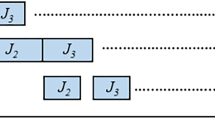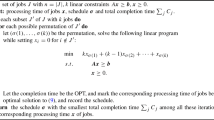Abstract
In the classical problem of scheduling on unrelated parallel machines, a set of jobs has to be assigned to a set of machines. The jobs have a processing time depending on the machine and the goal is to minimize the makespan, that is, the maximum machine load. It is well known that this problem is NP-hard and does not allow polynomial time approximation algorithms with approximation guarantees smaller than 1.5 unless P = NP. We consider the case that there are only a constant number K of machine types. Two machines have the same type if all jobs have the same processing time for them. This variant of the problem is strongly NP-hard already for \(K=1\). We present an efficient polynomial time approximation scheme (EPTAS) for the problem, that is, for any \(\varepsilon > 0\) an assignment with makespan of length at most \((1+\varepsilon )\) times the optimum can be found in polynomial time in the input length and the exponent is independent of \(1/\varepsilon \). In particular, we achieve a running time of \(2^{{\mathcal {O}}(K\log (K) \nicefrac {1}{\varepsilon }\log ^4 \nicefrac {1}{\varepsilon })}+\mathrm {poly}(|I|)\), where |I| denotes the input length. Furthermore, we study three other problem variants and present an EPTAS for each of them: The Santa Claus problem, where the minimum machine load has to be maximized; the case of scheduling on unrelated parallel machines with a constant number of uniform types, where machines of the same type behave like uniformly related machines; and the multidimensional vector scheduling variant of the problem where both the dimension and the number of machine types are constant. For the Santa Claus problem we achieve the same running time. The results are achieved, using mixed integer linear programming and rounding techniques.

Similar content being viewed by others
References
Ahuja, R.K., Magnanti, T.L., Orlin, J.B.: Network flows: theory, algorithms, and applications (1993)
Alon, N., Azar, Y., Woeginger, G.J., Yadid, T.: Approximation schemes for scheduling on parallel machines. J. Sched. 1(1), 55–66 (1998)
Asadpour, A., Saberi, A.: An approximation algorithm for max-min fair allocation of indivisible goods. SIAM J. Comput. 39(7), 2970–2989 (2010)
Bateni, M.H., Charikar M., Guruswami, V.: Maxmin allocation via degree lower-bounded arborescences. In: Proceedings of the Forty-First Annual ACM Symposium on Theory of Computing, pp. 543–552. ACM (2009)
Bezáková, I., Dani, V.: Allocating indivisible goods. ACM SIGecom Exch. 5(3), 11–18 (2005)
Bleuse, R., Kedad-Sidhoum, S., Monna, F., Mounié, G., Trystram, D.: Scheduling independent tasks on multi-cores with gpu accelerators. Concurr. Comput. Pract. Exp. 27(6), 1625–1638 (2015)
Bonifaci, V., Wiese, A.: Scheduling unrelated machines of few different types. arXiv preprint arXiv:1205.0974 (2012)
Chakrabarty, D., Chuzhoy, J., Khanna, S.: On allocating goods to maximize fairness. In: 50th Annual IEEE Symposium on Foundations of Computer Science, 2009. FOCS’09, pp. 107–116. IEEE (2009)
Chekuri, C., Khanna, S.: On multidimensional packing problems. SIAM J. Comput. 33(4), 837–851 (2004)
Chen, L., Marx, D., Ye, D., Zhang, G.: Parameterized and approximation results for scheduling with a low rank processing time matrix. In: LIPIcs-Leibniz International Proceedings in Informatics, volume 66. Schloss Dagstuhl-Leibniz-Zentrum fuer Informatik (2017)
Chen, L., Ye, D., Zhang, G.: An improved lower bound for rank four scheduling. Oper. Res. Lett. 42(5), 348–350 (2014)
Eisenbrand, F., Shmonin, G.: Carathéodory bounds for integer cones. Oper. Res. Lett. 34(5), 564–568 (2006)
Gehrke, J.C., Jansen, K., Kraft, S.E.J., Schikowski, J.: A ptas for scheduling unrelated machines of few different types. In: International Conference on Current Trends in Theory and Practice of Informatics, pp. 290–301. Springer (2016)
Gilmore, P.C., Gomory, R.E.: A linear programming approach to the cutting-stock problem. Oper. Res. 9(6), 849–859 (1961)
Goemans, M.X., Rothvoß, T.: Polynomiality for bin packing with a constant number of item types. In: Proceedings of the Twenty-Fifth Annual ACM-SIAM Symposium on Discrete Algorithms, pp. 830–839. Society for Industrial and Applied Mathematics (2014)
Hochbaum, D.S., Shmoys, D.B.: Using dual approximation algorithms for scheduling problems theoretical and practical results. J. ACM 34(1), 144–162 (1987)
Hochbaum, D.S., Shmoys, D.B.: A polynomial approximation scheme for scheduling on uniform processors: using the dual approximation approach. SIAM J. Comput. 17(3), 539–551 (1988)
Horowitz, E., Sahni, S.: Exact and approximate algorithms for scheduling nonidentical processors. J. ACM 23(2), 317–327 (1976)
Impagliazzo, R., Paturi, R., Zane, F.: Which problems have strongly exponential complexity? J. Comput. Syst. Sci. 63(4), 512–530 (2001)
Imreh, C.: Scheduling problems on two sets of identical machines. Computing 70(4), 277–294 (2003)
Jansen, K.: An eptas for scheduling jobs on uniform processors: using an milp relaxation with a constant number of integral variables. SIAM J. Discrete Math. 24(2), 457–485 (2010)
Jansen, K., Klein, K.-M., Verschae, J.: Closing the gap for makespan scheduling via sparsification techniques. In: 43rd International Colloquium on Automata, Languages, and Programming, ICALP 2016, July 11–15, 2016, Rome, Italy, pp. 72:1–72:13 (2016)
Kannan, R.: Minkowski’s convex body theorem and integer programming. Math. Oper. Res. 12(3), 415–440 (1987)
Knop, D., Koutecký, M.: Scheduling meets n-fold integer programming. J. Sched. 21(5), 493–503 (2018)
Kones, I., Levin, A.: A unified framework for designing eptas’s for load balancing on parallel machines. In: Sailing Routes in the World of Computation - 14th Conference on Computability in Europe, CiE 2018, Kiel, Germany, July 30–August 3, 2018, Proceedings, pp. 224–233 (2018)
Lenstra, J.K., Shmoys, D.B., Tardos, E.: Approximation algorithms for scheduling unrelated parallel machines. Math. Program. 46(1–3), 259–271 (1990)
Lenstra Jr, H.W.: Integer programming with a fixed number of variables. Math. Oper. Res. 8(4), 538–548 (1983)
Raravi, G., Nélis, V.: A PTAS for assigning sporadic tasks on two-type heterogeneous multiprocessors. In: Real-Time Systems Symposium (RTSS), 2012 IEEE 33rd, pp. 117–126. IEEE (2012)
Wiese, A., Bonifaci, V., Baruah, S.: Partitioned edf scheduling on a few types of unrelated multiprocessors. Real-Time Syst. 49(2), 219–238 (2013)
Williamson, D.P., Shmoys, D.B.: The Design of Approximation Algorithms. Cambridge University Press, Cambridge (2011)
Woeginger, G.J.: When does a dynamic programming formulation guarantee the existence of a fully polynomial time approximation scheme (FPTAS)? INFORMS J. Comput. 12(1), 57–74 (2000)
Acknowledgements
We thank Florian Mai and Jannis Mell for helpful discussions on the problem.
Author information
Authors and Affiliations
Corresponding author
Additional information
Publisher's Note
Springer Nature remains neutral with regard to jurisdictional claims in published maps and institutional affiliations.
This work was partially supported by the German Research Foundation (DFG) Project JA 612/16-1.
Rights and permissions
About this article
Cite this article
Jansen, K., Maack, M. An EPTAS for Scheduling on Unrelated Machines of Few Different Types. Algorithmica 81, 4134–4164 (2019). https://doi.org/10.1007/s00453-019-00581-w
Received:
Accepted:
Published:
Issue Date:
DOI: https://doi.org/10.1007/s00453-019-00581-w




